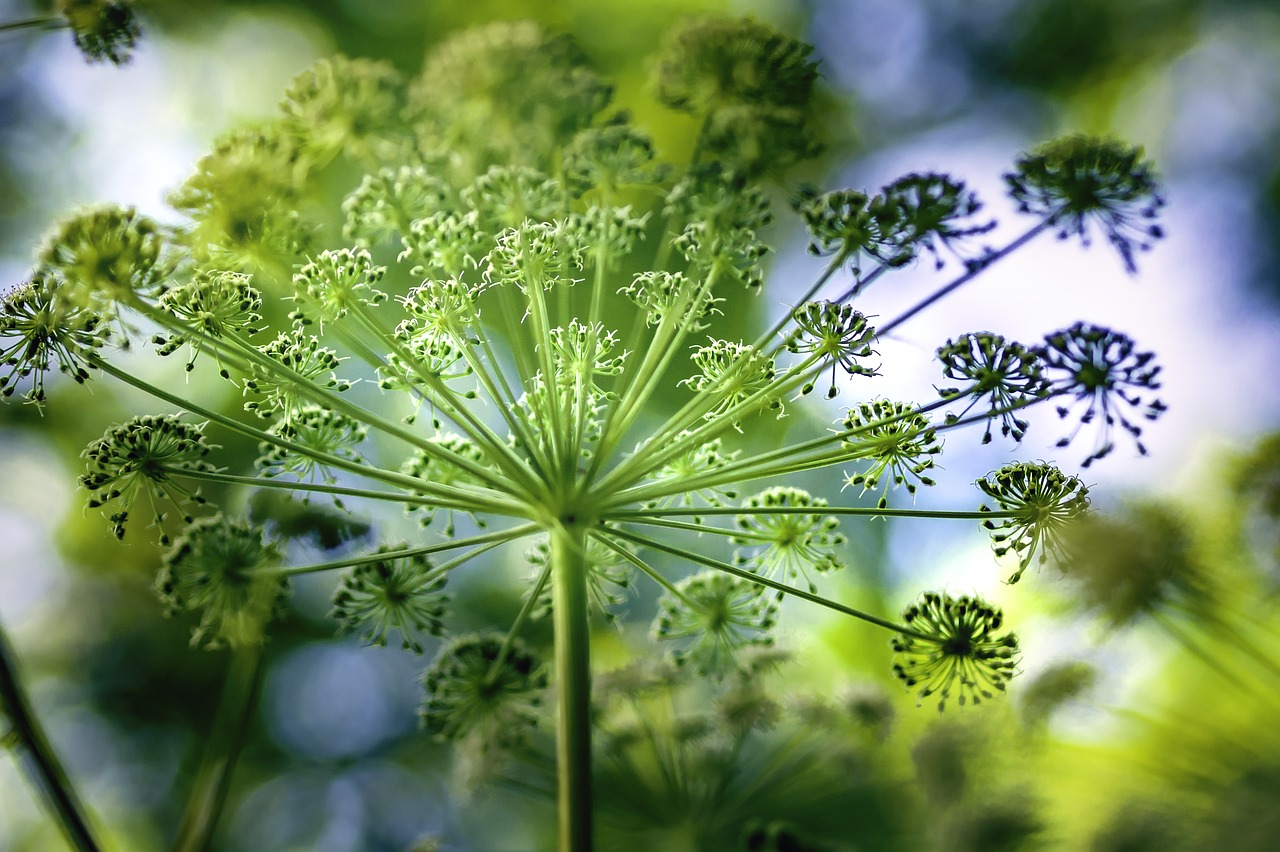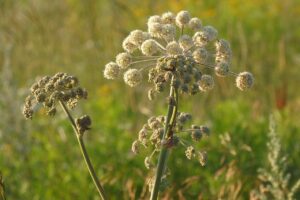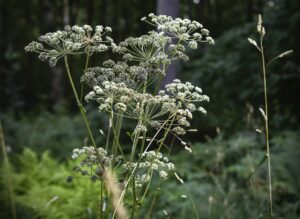Angelica Root
Overview
Angelica root, hailing from Angelica archangelica, is a biennial herb renowned for its medicinal qualities such as antioxidant and anti-inflammatory effects. Celebrated in both culinary and herbal medicine circles, this herb possesses an appealing flavor and fragrance, with a history of aiding in various health conditions and enhancing garden allure.
Common name(s): Common names include Garden Angelica, Wild Celery, and Norwegian Angelica.
Scientific name: Angelica archangelica

Characteristics
Known for its therapeutic qualities, Angelica root is praised for antioxidant, antimicrobial, and anti-inflammatory properties, and is commonly used in traditional medicine, particularly in Asia and Europe.
Region
Temperate and subarctic regions in the Northern Hemisphere.
Natural Habitat
Angelica Root is typically found in damp meadows, riverbanks, and woodland areas.
Cultivation
Prefers partial shade, moist soils, and can tolerate a range of soil types but thrives in deep, fertile, slightly acidic to neutral soil.
Traditional Usage
Angelica root has a storied past in traditional medicine, offering a variety of therapeutic uses. Here are some of the ways people harnessed its benefits historically:
- Managing blood complications and pain relief, especially in the realm of women’s health.
- Alleviating digestive issues, such as supporting gut health and digestion functions.
- Using as an herbal remedy for respiratory infections due to its anti-inflammatory properties.
The plant has been particularly revered in Traditional Chinese Medicine and European healing practices. Whether consumed or used in other forms, Angelica root was a versatile element in holistic health practices. Always remember to consult with a healthcare provider before using any herb for medicinal purposes.
Historical Usage
Valued for centuries in traditional medicine systems, particularly in Asia and Europe for health conditions including female reproductive issues and digestive disorders.
Common Usage
Used for health supplements, flavoring in culinary preparations, and aromatherapy.
Effects
Angelica root has a long-standing reputation in herbal medicine, prized for its myriad of health benefits. Its distinctive taste and scent have made it a valuable addition to gardens and a common choice for those interested in natural wellness practices. Focusing on its general effects, Angelica root is believed to contribute to better health in several ways.
The potential benefits include:
- Antioxidant Properties: Thought to combat oxidative stress and reduce the risk of chronic diseases.
- Antimicrobial Effects: May inhibit the growth of various bacteria and fungus.
- Anti-inflammatory Action: Could help in reducing inflammation, aiding in the management of inflammatory conditions.
- Support for Women’s Health: Traditionally used to ease certain female health issues.
- Digestive Aid: Often used to soothe digestive disturbances.
- Respiratory Health: Employed in the treatment of respiratory infections.
- Pain Alleviation: Known to help in reducing discomfort and pain.
It’s worth noting that while Angelica root is associated with these therapeutic effects, its active compounds such as coumarins, flavonoids, and terpenoids are responsible for its healing potential. However, the effectiveness and safety of Angelica root should be assessed individually, and usage should be approached with care due to possible risks such as allergies or interactions with medications. Consultation with a healthcare provider is advised before incorporating Angelica root into your health regimen1 4.

Angelica root is valued for its soothing digestive properties and potential to support respiratory health.
Effects when smoking
Angelica root is an herb traditionally appreciated for its potential health benefits which include antioxidant, antimicrobial, and anti-inflammatory properties. However, when it comes to smoking Angelica root, there is limited information on its specific effects. It’s crucial to remember that combustion of any plant material, including herbs, can release harmful byproducts. That being said, here is a summary of potential effects, keeping in mind the general properties of the herb:
– **Aromatherapeutic**: The act of smoking Angelica root might carry a pleasant scent, tapping into its traditional use for its notable flavor profile.
– **Respiratory Impact**: Inhalation of smoke from any combusted plant material could pose risks to lung health.
– **Psychoactive Potential**: There is no substantial evidence to suggest Angelica root has psychoactive effects when smoked.
– **Therapeutic Compounds**: Compounds such as coumarins, flavonoids, and terpenoids in Angelica root may have therapeutic effects, but their efficacy when inhaled as smoke is unclear.
- It’s advisable to proceed with caution if choosing to smoke Angelica root, considering the lack of specific research and possible health risks related to smoking in general.
- Consult with a healthcare provider for personalized advice, especially if there are existing health concerns or medications in use.
- Considering potential interactions and allergic reactions, it’s prudent to start with small amounts to gauge personal tolerance and effects.
In conclusion, while Angelica root has a history of use in herbal medicine, its application as a smoked herb is not well-documented and warrants careful consideration and professional input.
Flavor Profile
Pleasant and notable, suitable for culinary use, enhancing taste experiences.
Edible Parts
Root, seeds, and young stems
Effects when Smoked
Effects of smoking Angelica root are not documented; inhalation of combustion products can be harmful.
User Experiences
User experiences with Angelica root often reflect its perceived health benefits, though individual responses can vary and are not extensively documented.
Medicinal Benefits
Angelica root is associated with a variety of medicinal benefits, particularly due to its bioactive components believed to exhibit antioxidant, antimicrobial, and anti-inflammatory effects. Historically, Angelica root has been harnessed in traditional medicine to support health in several ways.
Potential Medicinal Benefits include:
- Mitigating respiratory infections through its antimicrobial properties.
- Alleviating digestive issues, possibly by reducing inflammation.
- Supporting women’s health, particularly in managing symptoms associated with menstruation and menopause.
- Potentially relieving pain, which may be beneficial for headaches and other bodily discomforts.
To fully harness these benefits, it’s essential to consult a healthcare professional—especially since individual health conditions and reactions can vary. Using Angelica root responsibly can contribute to its effectiveness as a therapeutic aid[1] [4].
History and Folklore
Angelica root has held a place of honor in traditional herbal medicine for centuries, finding particular reverence in Asian and European cultures. In Traditional Chinese Medicine, it has been valued for its potential to alleviate blood deficiency-related complications, provide pain relief, and support women’s health. European traditions also employed Angelica for its purported healing properties, using it to treat respiratory infections, digestive disorders, and a myriad of women’s health issues.
Its reputation as a versatile and beneficial herb in gardens and traditional medicine practices evidences the deep historical roots of Angelica’s use. 1 4

Historical reverence for Angelica root shines through centuries of medicinal use in Asian and European healing traditions.
Side Effects and Contraindications
When considering Angelica root for home smoking or herbal remedies, it’s important to be aware of potential side effects and contraindications. Some individuals may experience allergic reactions to Angelica root, characterized by symptoms such as skin rashes, difficulty breathing, or anaphylaxis in severe cases. Additionally, due to its effects on blood and circulation, Angelica root might interact with blood-thinning medications, potentially increasing the risk of bleeding. Pregnant women should avoid using Angelica root as it may influence hormonal activities and possibly lead to contractions or other complications. It’s always advised to consult with a healthcare professional before starting any new herbal treatment, especially for those with pre-existing health conditions or those taking other medications.
Side Effects:
- Allergic reactions
- Possible increase in bleeding risk when combined with blood thinners
Contraindications:
- Pregnancy
- Pre-existing health conditions
- Current medication interactions
Legal Status
Angelica root is typically considered legal for use in herbal preparations in most jurisdictions. There is no indication in the provided sources that the herb is subject to any legal restrictions or regarded as a controlled substance. Its legal status likely reflects its historical and contemporary use in traditional medicine, rather than any narcotic or psychotropic properties that might result in regulation. Those looking to use Angelica root in any form should, of course, verify local regulations to ensure compliance.
For therapeutic applications, consulting with a healthcare professional is recommended to avoid contraindications and ensure safety.
References
1. “Angelica: Benefits, Side Effects, and Preparations – Verywell Health.” Verywell Health. https://www.verywellhealth.com/angelica-what-you-need-to-know-89539
2. “How to Grow and Care for Angelica – The Spruce.” The Spruce. https://www.thespruce.com/angelica-plant-growing-guide-5195323
3. “Angelica – Wikipedia.” Wikipedia. https://en.wikipedia.org/wiki/Angelica
4. “4 Benefits Of Angelica Root: Dosage & Safety – The Botanical Institute.” The Botanical Institute. https://botanicalinstitute.org/angelica-root/
Image Credit: marjattacajan
Image Credit: marjattacajan
Image Credit: marjattacajan
Nicolas Duval
Nicolas is a passionate advocate for nature and the art of wildcrafting. His dedication shines through in Wildcraftia, a website he meticulously crafted to serve as a haven for nature enthusiasts worldwide. Driven by a deep appreciation for nature’s connection to humanity, Nicolas embarked on his journey in 2011 with SmokableHerbs, a platform showcasing his love for nature’s bounty. Building upon this foundation, he established Smokably, a thriving online store offering premium herbs and blends to a global audience.
